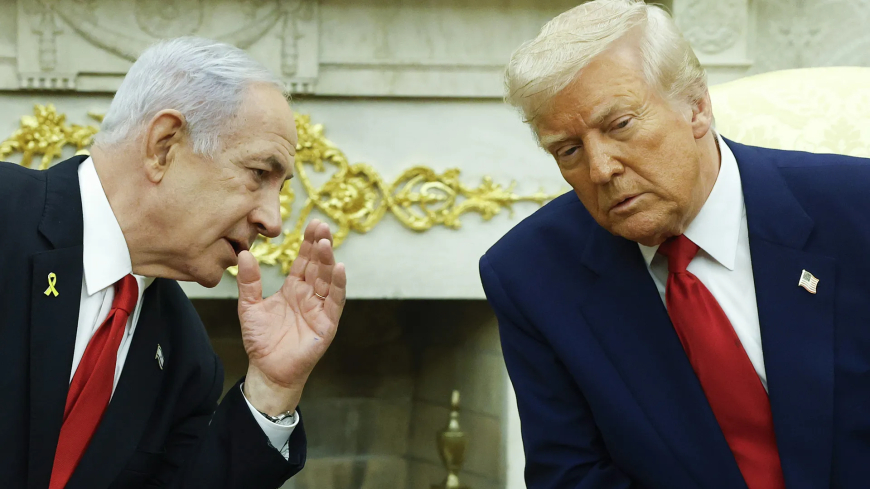Talks Collapse: US & Israel Pull Back from Gaza Ceasefire Negotiations After Hamas Fails to Show Good Faith
The U.S. and Israel have withdrawn teams from Gaza ceasefire negotiations in Qatar, citing Hamas’s failure to act in good faith. The breakdown raises fresh questions about the prospects for a humanitarian truce.

The U.S. and Israeli delegations abruptly withdrew from ongoing ceasefire negotiations in Qatar on Thursday just hours apart, citing frustration over what they described as Hamas’s failure to engage in “good faith.” The unexpected move casts new doubt on the viability of reaching a near-term pause in Gaza's conflict, dragging indirect negotiations toward an uncertain future ReutersAl JazeeraThe Guardian.
1. A Sudden Halt: Diplomatic Teams Exit Doha
U.S. Special Envoy Steve Witkoff—appointed by former President Trump to lead hostage negotiations—told reporters the American delegation had departed for consultations back home, complaining that Hamas was “not coordinated or acting in good faith” Reuters+15Al Jazeera+15The Washington Post+15. Shortly afterward, Israel’s Prime Minister’s office confirmed its team also left Doha, though Israeli officials insisted their withdrawal was temporary and that negotiations would resume after a strategy review Fox News.
2. Why Hamas Is Blamed for Collapse
According to Witkoff, mediators including Qatar and Egypt exerted considerable effort, but Hamas’s demands and adjustments to prior agreed terms made progress impossible Wikipedia+15Al Jazeera+15Algemeiner.com+15. Earlier reports indicate that Hamas submitted a response conditionally acceptable if Israel met certain prerequisites, such as troop redeployment and assurances an offensive would not resume post-ceasefire Reuters.
Still, negotiators argue Hamas significantly revised its stance late into the talks, undermining trust and blocking momentum. The demands focused on hostages, Israeli military posturing, and humanitarian logistics—areas in which Israel again balked.
3. The Proposed 60-Day Framework
Under the most recent proposal, both parties had tentatively agreed to a 60-day ceasefire with staged hostage releases: Hamas would free 10 living captives and hand over remains of 18 deceased, with Israel reciprocating by freeing Palestinian prisoners and increasing aid access into Gaza The Washington Post+5Al Jazeera+5The Guardian+5.
Yet, key unresolved issues—particularly regarding Israeli troop positions and Hamas’s political role—were never fully harmonized, leading to last-minute breakdowns The Guardian+15The Guardian+15Reuters+15.
4. Humanitarian Catastrophe: Gaza in Crisis
The geopolitical impasse belies a worsening humanitarian emergency in Gaza. The United Nations and aid agencies report at least 115 Palestinians have died of malnutrition and starvation in the past few weeks alone AP News+3Al Jazeera+3Al Jazeera+3.
Food convoys have been targeted—dozens of civilians killed while seeking aid. Journalists in the UNRWA-run hospitals are fainting from hunger, while more than 1,000 people have perished near aid distribution points due to crowding and resource scarcity AP News+1The Times+1.
—
5. International Pressure Mounts
Global outrage is growing at the stalemate. British Prime Minister Keir Starmer condemned the “unspeakable and indefensible” starvation and warned against interpreting Israel’s flexibility as weakness Reuters+1AP News+1. Meanwhile, France’s decision to recognize Palestinian statehood at the upcoming UN General Assembly is seen as a sign that international patience is wearing thin The Guardian+1The Guardian+1.
6. Hamas Maintains a Hopeful Stance
Despite criticism, Hamas officials remain optimistic, with a senior source telling Reuters a deal remains possible within a few days, provided outstanding issues are resolved Reuters. Yet Hamas continues to demand full Israeli withdrawal from Gaza—beyond the interim lines Israel has offered—keeping major gaps unresolved The Guardian+15Reuters+15AP News+15.
7. U.S. Strategy Shift: What Lies Ahead
Witkoff warned that, absent progress, Washington is considering “alternative options” to secure hostage releases and stabilize Gaza Reuters+11Al Jazeera+11Reuters+11. Whether this means hardline diplomatic tactics, pressure campaigns on Hamas, or seeking new mediation frameworks, the U.S. appears ready to pivot.
Israel, meanwhile, signaled a reluctant willingness to reengage but remained firm on conditions: Hamas must dismantle armed capability and agree to new troop deployment maps before negotiations can proceed ReutersThe Guardian.
—
8. What’s at Stake: Hostages and Hope
Hostage families are growing anxious. The Hostages Families Forum expressed concern that delays threaten the lives of captives and hinder intelligence gathering vital for rescue or recovery Reuters. Meanwhile, communities in Gaza face the monthly convergence of conflict and starvation, with no firm pathway to relief.
—
9. Shifting Diplomatic Landscape
This breakdown is only the most recent challenge in a drawn-out diplomatic struggle. Previous ceasefires in 2023 and early 2024 collapsed under similar conditions—disagreements over troop withdrawal, war cessation, and political authority in Gaza WikipediaWikipediaWikipedia.
International actors—Qatar, Egypt, the U.S., U.N., EU, and UK—have all urged renewed efforts. The question now is whether renewed mediation can overcome mistrust fast enough to let humanitarian relief take hold.
—
10. Looking Forward: A Moment of Reckoning
As both sides regroup, pressure will build from multiple fronts:
-
Internally in Israel, mounting unrest and demands for faster hostage returns may pressure leaders to tone-down military rhetoric.
-
In Gaza, the humanitarian toll will intensify condemnation and calls for urgent aid corridors.
-
Internationally, renewed global attention may shift policy positions or prompt new peace formats.
But unless Hamas scales back its demands significantly or Israel offers credible concessions on troop positions, a true breakthrough seems unlikely in the short term.
—
Conclusion
The abrupt withdrawal of U.S. and Israeli teams from Doha marks the latest casualty in efforts to broker a ceasefire in Gaza. With hunger claims mounting and hostages still trapped, the international community faces tough choices. Stalemate could snowball into deeper crisis—though it may also sharpen global urgency toward a deal. In the end, the true benchmark will be whether diplomatic fatigue gives way to renewed resolve fast enough to save lives.




















































